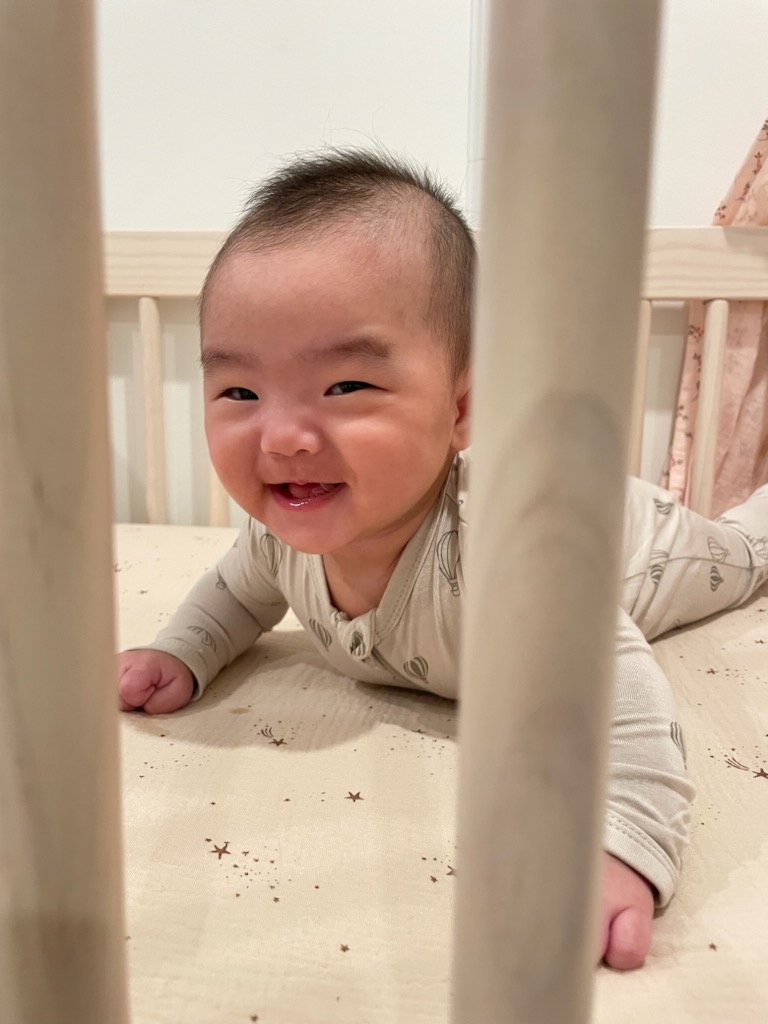Does my baby have low sleep needs? (and what to do about it)
Here’s the thing about baby sleep that most Instagram grids and parenting books don’t say out loud:
Not every baby is going to nap twice a day for 90 minutes and sleep 12 hours at night.
Some babies take rest very seriously, while others can survive on cat naps.
Both can be totally normal, but when it’s the latter, that might mean your baby has low sleep needs.
But before you decide that’s the culprit, let’s discuss what that actually means, how to know if your baby fits the bill, and what to do when the nap schedule you made up in your head just isn’t working.
What are average sleep needs?
Quick preface: when I create sample schedules on Instagram, I always aim for the middle-to-high end of the sleep needs spectrum, because I’d rather build a day that offers your baby the opportunity for more rest, and then adjust based on how they do.
If we start small (let’s say with two 30-minute naps), we might never know that your baby could take a longer nap with the right setup. But if we aim for more and they consistently take less, we can adjust from there with confidence in their needs, not anxiety.
That being said, here’s a very general idea of total sleep needs by age:
0-3 months: ~14-17 hours
4-11 months: ~12-15 hours
1-2 years: ~11-14 hours
3–5 years: ~10–13 hours
But these are ranges, not mandates.
So what if your baby isn’t hitting those numbers?
It might be low sleep needs.
Some babies fall naturally on the lower end of these ranges. Typically low sleep needs babies:
Drop naps earlier than most (a 12-month-old doing well with just one nap, for example)
Have a hard time staying asleep unless every sleep condition is just right
Are super sensitive to wake windows
Get labeled “bad sleepers” because they don’t sleep as long as others expect
Is it low sleep needs or is it a sleep problem?
Excellent question!
There are cases where a baby isn’t sleeping well, not because they need less sleep, but because their sleep is inconsistent or unpredictable. That might look like:
A bedtime that changes every night
A nap schedule that shifts by the hour
No clear wind-down routine
Middle of the night wake-ups that require milk, holding or settling support from a parent
Babies thrive on rhythm. If your baby hasn’t had the chance to expect sleep at regular times, or if independent sleep hasn't been introduced yet, it’s very possible they’re resisting sleep simply because they’re overtired or confused, not because they need less.
So before you decide your baby has low sleep needs, make sure you’ve given them a consistent routine and a predictable sleep environment. That foundation matters more than you think.
If your baby is low sleep needs, here’s what to do next:
The hard truth is your baby might not need as much sleep as your best friend’s baby.
Or your pediatrician’s chart.
Or that one mom in the Facebook group whose 10-month-old sleeps 14 hours a night and takes two 2-hour naps.
If your child has crib confidence and wakes up rested, even after a 45-minute nap or a slightly shorter night, they might have low sleep needs. And that’s not a problem to fix, but I know it can be exhausting.
Step one: breathe.
You’re not doing anything wrong.
You don’t need to “fix” your baby. You just need to adjust your expectations.
Low sleep needs babies often do better with:
Longer wake window- more stimulation and sensory input to be ready to fine sleep
One solid nap instead of two *meh* ones
A bedtime that reflects their sensory profile, not the one from the chart
We’re not looking for a baby-book-perfect nap performance. We’re looking for well-rested babies, whatever that looks like for them.
It’s also a hard reality that shorter naps means shorter breaks for you.
If you’re frustrated with the lack of me-time, try experimenting with different wake window activities that are fun for your baby and re-energizing for you:
Go for a walk at the park
Grab a coffee
Go browse your favorite store together
Get in the sunshine
Schedule a hang with a friend
Do something that isn’t just baby play so those longer wake windows don’t leave you mentally and physically drained.
Don’t compare sleep schedules.
Let me tell you something I see all the time:
A parent finds a schedule online (maybe one of mine) and thinks, “Wow, that’s a lot of sleep. My baby’s nowhere near that. What am I doing wrong?”
Nothing. There might be nothing wrong.
Sample schedules show you what’s possible, not what’s required.
They’re a starting point. A way to see what your baby might do with support and consistency. But they’re not a promise. Your baby might hit those numbers, or they might take half the nap time and still wake up grinning. Either way, you’re not failing.
Your job isn’t to mold your child to a schedule that works for someone else’s baby. It’s to understand what works for your baby, and support them with rhythm, consistency, and realistic expectations.
If your child sleeps less but wakes rested and happy, that’s success.
But if you're unsure whether it’s a need vs. a pattern, that’s where I come in!
Stop googling “why won’t my baby nap,” and book a free consultation call with me!
Let’s find a schedule that works for your baby and the whole family.
To better sleep,
Ella


